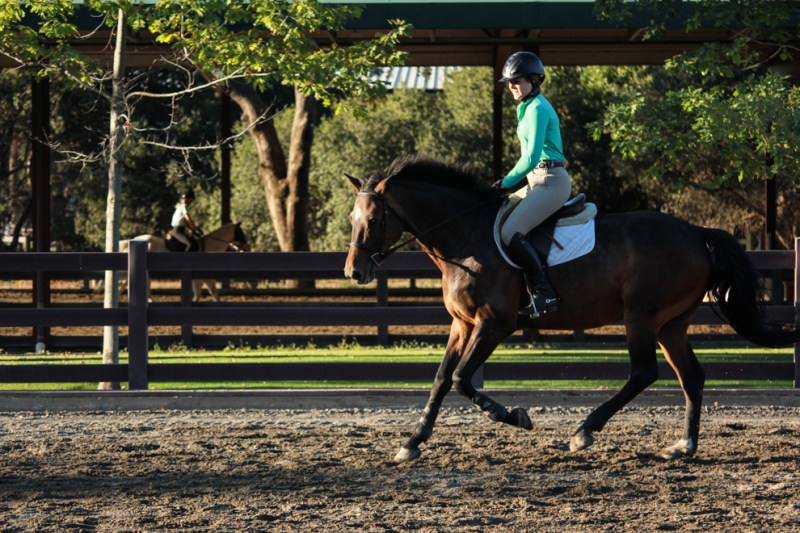In many sports, when the season comes to a close, teammates continue to train, condition and prepare to start fresh again the following year. While the same is true with Stanford’s equestrian team and polo club, these two teams also take on additional responsibility in the summer: the care of over 50 1,100-pound horses ranging from semi-retired mounts to seasoned competitors.
Riders from both barns – the equestrian team located on campus at the Red Barn stable, and the polo club located off campus at Webb Ranch – continue to dedicate countless hours to maintaining the health and fitness of these animals, taking on training and exercise as well as day-to-day care responsibilities.
For the members of the equestrian team, who are divided into three groups based on event – the Dressage Team, Hunt Seat Team and Western Team – the regular agenda during the school year shifts dramatically during the summer months. Riders share much of the day-to-day feeding and grooming tasks with the Red Barn’s full-time barn staff, the team’s alumni network and other members of the local community who participate in riding lessons and horsemanship classes.
However, it’s the members of the equestrian team who are primarily in charge of maintaining the horses’ fitness. For the summer, the number of riders reduced from 40 to 15; therefore, those remaining in the area over the summer have to take on quite a bit of extra riding, sometimes exercising two or three different horses in a single day since it’s critical that every horse stays in shape in order to dive immediately back into a heavier work schedule in the fall.
“Most of the horses get ridden every day,” said Dressage Team rider Carolyn Kravitz ’18. “They’re athletes. You wouldn’t train for a marathon by sitting in your bedroom. Most of [the horses] are coming out of the school year, and we’re trying to just maintain their fitness.”
Nonetheless, much of the riding done in the summer is more leisurely than the intense training that goes on during the school year. Instead of working over poles or jumping, riders take the horses out for “hacking,” which is generally more relaxed flat work designed to keep the horses active without overworking them. Still, the horses do continue with occasional more difficult lessons.
“We have lessons with our trainers just to keep up with the jumping,” said English Hunt Seat Team rider Cecilia Lang-Ree ’17. “It also helps with their mentality and their brain, because if they don’t work and exercise, they get neurotic, full of energy and hard to manage. So we’re keeping them in good shape, keeping their condition up and keeping their mind in the right place so when we get back to school, we can be competitive right away.”
Expressing agreement, Kravitz reported that during the summer the team is “more in maintenance mode than in building mode.”
Stanford’s polo club’s summer activities are entirely different. The polo ponies are kept off campus at Webb Ranch, where they’re often exercised in the field, and then transported in a trailer once a week to Horse Park at Woodside, where the team practices riding drills and plays in scrimmage tournaments against local teams. Intercollegiate matches during the school year always take place in an arena, but during the summer, the club also gets to play on the more standard grass fields.
Unlike with the equestrian team, not only do the fitness and exercise responsibilities fall to the club, but so do nearly all of the day-to-day chores. At least one member of the entirely student-run team pays a visit to the ranch every day to check on the horses.
“We are the ones ultimately responsible for the horses, finances and general management of the club,” said Laura Curt ’14, the polo club’s president. “The ranch feeds for us, but we do all the exercising.”
The polo players are also working to continuously advance their skills over the summer, as well as build horsemanship and prepare the polo ponies for fall tournaments. According to Curt, the summer scrimmages, while less competitive and more laid-back than during the year, still demand a lot of hard work from both horse and rider, so it’s critical that the polo players remain involved in the activities of all the horses.
“Horses are a lot of responsibility,” said polo club member Elizabeth McCune ’18. “They’re big animals with moods and temperaments, and sometimes they’re not feeling it and don’t want to do something. You’ve got to learn to listen to them.”
While both teams have different schedules for keeping their horses on track to compete during the school year, they both have the same number one priority: the health and happiness of their horses. Horses need constant care and individual attention, and riders from both the equestrian team and the polo club rise to meet the needs of every single horse, both in the arena and in the stable.
Correction: An earlier version of this article incorrectly listed Cecilia Lang-Ree as Cecilia Lang-Dee. The Daily regrets this error.
Contact Shannon O’Hara at shannonohara16 ‘at’ mittymonarch.com.
